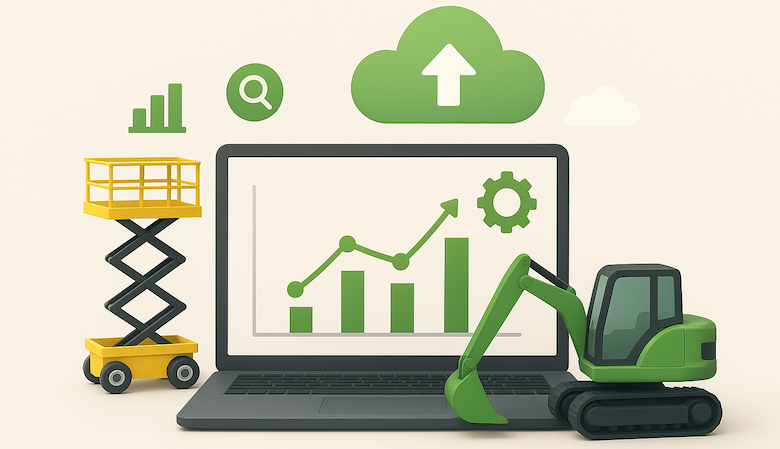The rental industry is incredibly rich in data. Every transaction, every fleet movement, every service ticket, and every customer interaction generates information.
For decades, this information remained siloed, underutilized, or locked away in legacy systems. The result is that many rental businesses still operate reactively, relying on historical reports rather than forward-looking insights.
But as an industry, we’re working toward a more proactive, data-driven future. With thousands of businesses relying on our systems at Point of Rental, we process vast volumes of rental data every day. By anonymizing and standardizing information, we’re helping the industry move from reactive decision-making to proactive rental intelligence.
The Untapped Potential of Rental Data
Rental companies track dozens, if not hundreds or thousands of things: Asset utilization rates, maintenance cycles, customer demand, contract values, etc. There’s never been a shortage of data.
What we’ve lacked is a framework to organize, compare, and act on that data.
Without standardization, equipment can be labeled differently in every system, using nicknames, regional terms, model numbers instead of names, misspellings, etc., making benchmarking nearly impossible. And without modern analytics, you’re stuck with static reports that describe what happened but offer little guidance on what to do next.
Data-driven decision makers outperform their peers in growth, efficiency, and customer satisfaction. The faster we can act on data insights, the more we outperform our competition.
Two Inflection Points Changing the Game
So why is data, and how we use it, changing the game now? There are two recent developments that have drastically impacted what’s possible for rental businesses who want to make smarter decisions:
- The work of the American Rental Association on its Standard Equipment Taxonomy. This initiative provides a common language for categorizing equipment across the industry. By aligning data to this taxonomy, apples-to-apples comparisons become possible, regardless of how each individual rental company labels its assets.
- The rapid advancement of modern AI tools. We’ve applied these tools to map thousands of unique customer naming conventions back to the taxonomy. This has not only accelerated the alignment process, but also identified gaps where the taxonomy could be expanded. By feeding these improvements back into the industry standard, we’re helping raise the bar for everyone, not just Point of Rental customers.
From Insights to Action
At Point of Rental, our initial focus is on using our extensive data to provide comparative insights for our users. Customers will be able to benchmark key metrics, like average contract value, fleet utilization, or maintenance turnaround time against aggregated industry peers.
These insights allow operators to spot gaps, identify opportunities, and prioritize decisions that have the greatest financial and operational impact.
But our vision extends beyond static benchmarking. We believe the future of rental intelligence is dynamic and actionable. Instead of simply informing decisions, data platforms will increasingly automate them.
Imagine a system that identifies when equipment is approaching the end of its optimal ROI lifecycle and automatically posts it for sale (informing you first, of course; we’d hate to have you mistake a buyer for a thief). Or a system that recognizes patterns in customer demand and triggers reordering of specific fleet categories. Or one that suggests adjustments to sales territories based on real-time contract activity and market trends.
In this future, the data platform becomes the nerve center of the rental business, orchestrating workflows, guiding strategy, and amplifying operator productivity.
Trustworthy Innovation
Did you ever get great advice from someone who you didn’t trust? No matter how good that advice was, you probably hesitated to follow it.
The same is true for technology and AI: If you can’t trust it, you won’t use it.
Point of Rental users are rightfully protective of their data, and we work to exceed even their level of vigilance. Anonymization, aggregation, and rigorous governance are fundamental principles of our rental intelligence platform. Data must empower users without ever compromising privacy or competitive integrity.
Trust also comes from usability. Advanced analytics are only valuable if they are accessible to the people who need them. That is why human-centered product design is as important here as it is in other areas of rental technology. Insights must be presented in intuitive, actionable formats that help operators act quickly rather than leaving them to interpret complex dashboards.
Industry Trends Pointing to a Data-Driven Future
We already see businesses beyond the rental industry moving this way:
- By 2026, analysts predict that predictive analytics will be a standard practice for more than half of mid-sized industrial businesses.
- In asset-intensive sectors, predictive maintenance is already reducing downtime by double-digit percentages. Cloud platforms and AI-driven data mapping are accelerating adoption by lowering the barriers to integration and scalability.
Within rental, we’re also seeing strong demand for realtime fleet visibility, automated invoicing, and AI-based forecasting. The phrase “the past is becoming the future” means more than ever.
The Road Ahead
We are at the beginning of a transformation, and the implications are profound.
Instead of reacting to yesterday’s challenges, rental companies can anticipate tomorrow’s opportunities. Instead of guessing which assets to expand, they can invest confidently with evidence-based demand forecasts. Instead of losing value on equipment that’s beyond its peak ROI, they can time disposals precisely for maximum return.
With the right platforms, companies can unlock the intelligence hidden in their operations, drive efficiency, and deliver new value to customers.
At Point of Rental, we’re excited to lead this shift. By combining industry standards, modern AI, and the wisdom of our global customer base, we’re turning rental software into more than a management system: We’re turning it into a decision engine.
The future of rental is about turning data into decisions as quickly as possible. Rental intelligence will provide a huge advantage to the companies that use it.
What’s your data doing for you?

